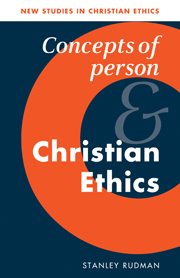Book contents
Conclusion
Published online by Cambridge University Press: 02 December 2009
Summary
The ideas and arguments assembled and analysed throughout our study form part of an attempt to construct a reading of personhood that adequately reflects its past and is also able to respond to the creative changes that are taking place in a variety of disciplines that have an interest in personhood. The inquiry we have pursued suggests that personhood has a depth and complexity that is not always adequately represented even in those definitions and arguments which make personhood central to ethical debate, particularly in relation to the boundaries of the beginning and end of life (cf. abortion and euthanasia) or in relation to the boundaries between human and non-human (cf. animal welfare) where in both cases the status and rights of the (moral) subject are in question. A repositioning of personhood, we argued, is called for in ethical contexts to do justice to the social dimension of personhood. This would take account of what happened in previous centuries in response to social, cultural and religious movements of ideas, and would include reconsideration of the significance of Christian traditions of personhood. Although there may be a certain attraction in the idea that ‘person’ as a purely moral term could fulfil a useful role in moral argument, our examination of the varied historical usage indicates that contemporary ‘moral personhood’ reflects a partial usage selected for a limited normative role.
- Type
- Chapter
- Information
- Concepts of Person and Christian Ethics , pp. 335 - 340Publisher: Cambridge University PressPrint publication year: 1997



